
In a significant move aimed at addressing the challenges within the UK economy, the Bank of England (BoE) has announced a rate cut, marking a pivotal moment in the nation’s monetary policy. This decision comes with a cautionary note regarding the potential impacts of the government's budget plans on inflation.
The decision to lower interest rates reflects ongoing concerns about economic growth and inflationary pressures that have been intensified by recent fiscal policies. The BoE has faced scrutiny for its approach to controlling inflation, which had previously surged to rates not seen in decades. Economists have expressed fears that the combination of government spending and rising prices could complicate the recovery as the UK emerges from post-pandemic economic challenges.
During the announcement, BoE officials highlighted that while the rate cut is intended to stimulate growth by making borrowing cheaper for businesses and consumers, there are inherent risks involved. The central bank emphasized that the effects of government spending on inflation must be carefully assessed. A potential spike in inflation could undermine the benefits of the rate cut, leading to increased costs of living and further economic strain on households.
This decision follows a series of previous rate hikes implemented by the BoE, which aimed to combat high inflation levels. However, these hikes have also raised concerns about their impact on consumer spending and overall economic activity. With the current economic landscape in a state of flux, the BoE's latest strategy reflects a cautious balance between fostering growth and managing inflationary risks.
Analysts predict that the repercussions of the rate cut will be closely monitored in the coming months. The BoE is likely to remain vigilant, closely observing the interplay between government fiscal policy and inflation metrics to gauge the effectiveness of its monetary measures. The central bank's stance indicates that further adjustments may be on the horizon depending on economic trends.
Ultimately, the BoE's recent move underscores the intricate challenges facing policymakers in the UK as they navigate the delicate balance between growth stimulation and inflation control. This ongoing situation will require careful management as the nation strives to maintain economic stability in an unpredictable global context.
As the discussions surrounding the BoE's rate cut continue, stakeholders from various sectors are left pondering the long-term implications of this significant policy change. Engaging in a broader dialogue around the future of the UK's economic conditions will be crucial as analysts and policymakers alike seek to devise strategies for sustainable growth amid evolving financial landscapes.
In summary, the Bank of England's recent rate cut serves as a crucial indicator of the challenges and opportunities that lie ahead for the UK economy. The road forward will heavily depend on the delicate interplay between monetary policy and fiscal initiatives, setting the stage for a closely watched economic trajectory in the months to come.
#BankOfEngland #InterestRates #EconomicPolicy #Inflation #UKEconomy #FinanceNews #FiscalPolicy
Author: Rachel Greene




